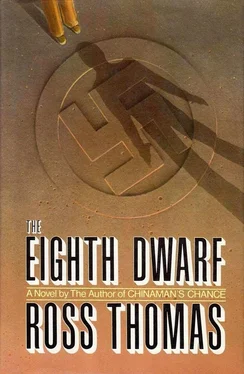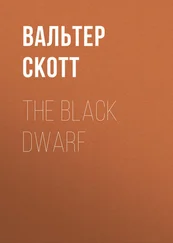Promptly at 5:30 Orr entered the Willard bar and strode across the room to the corner table where Jackson sat. Jackson started to rise and shake hands, but Orr waved him back into his seat. He stood, carefully tailored as always, rocking back and forth on his heels, his hands clasped comfortably across his huge belly, as he inspected Jackson for evidence of sloth and decay.
“You’re older, Minor,” he said, settling into a chair. “You’re older and thin. Far too thin.”
“Your beard’s gone gray,” Jackson said. “What do you want to drink?”
Orr said he wanted Scotch, and Jackson ordered two of them from a waiter. When the drinks came, Orr tasted his and said, “Did you ever get it?”
“Get what?”
“Your medal. They put you in for one, you know. A Bronze Star, I think, for something wonderful and brave that you did in Burma. What thing wonderful and brave did you do in Burma, Minor?”
“I got jaundice.”
“Maybe it was for that.”
“Probably.”
“I’ll have to look into it.”
“Is that what you’re still doing, looking into things?”
Orr took another swallow of his drink. “We’re in hiding. That’s mostly what we do all day long. Hide.”
“They’re after you, huh?”
“Indeed. You’ve heard, of course.”
“I’ve heard.”
“They split us up, you know. The War Department got Intelligence and Special Operations. Research and Analysis went to State. Nine hundred of us. You should have heard the screams from the old-line State crowd. Can you imagine Herbert Marcuse in State?”
“It’s hard. Who else is left?”
“Well, a few are hanging on by their much-gnawed fingernails overseas. Let’s see, Phil Horton’s in France, Stacey is here, Helms is in Germany, Al Ulmer’s in Austria, Angleton’s in Italy, Seitz is in the Balkans, of course. And — oh, yes — Jim Kellis is in China.”
“What’s going to happen?”
“Give us a year and we shall rise again like the Phoenix, God and Joe Stalin willing.”
“The Communist hordes, huh?”
“Exactly.”
“Who’s going to run it — Donovan?”
Orr shook his head. “Not a chance. I suspect that he’ll be made ambassador to somewhere dreadful and unimportant. Chile or Siam — one of those places. I understand he needs the money. Now tell me, what mischief are you up to, Minor? I do so hope it’s something really nasty.”
Jackson shrugged. “I just want to get to Germany, and I don’t want anybody to bother me when I get there.”
Orr stroked his beard and pursed his lips. “Why Germany?”
“I think I can make some money there.”
“Legally?”
“Almost.”
“Dare I ask doing what?”
Jackson grinned and said, “A very delicate mission of a most confidential nature for old friends.”
Orr beamed. “Oh, my, you do have something naughty, don’t you?”
“Maybe.”
“Let’s see, how shall we work it? You could go as Germany’s first postwar tourist. You’d be just in time for the Oktoberfest. But I think we’d better come up with something just a tiny bit more blatant so that the Army can understand it. Let me think.” Orr closed his eyes. When he opened them a few moments later he was smiling. “Next Thursday at Two.”
“Jesus.”
“Surprised?”
“Nobody knows about that.”
“I do,” Orr said. “But then, I know everything. It really wasn’t that bad a play. I’m surprised it was never produced.”
“I’m not.”
“But there we have it, you see. Minor Jackson, noted playwright, war hero — I must dig up that medal — and, let’s see, what else have you done?”
“Nothing.”
“No matter. You have decided to turn your sensitive gaze on postwar Germany and to write, I think, a book; yes, a book about what you have seen with your own eyes. A friend of mine’s in publishing in New York, and I can get a letter down from him with no problem, since it won’t cost him a penny. After that, I’ll simply walk it through. Let me have your passport.”
Jackson took his passport out and handed it over. Orr thumbed through it idly and said, “Rather a nice likeness.”
Jackson swallowed some more of his drink and, keeping his voice toneless and casual, said, “Did you ever hear of a Romanian who calls himself Nicolae Ploscaru?”
Still thumbing through the passport, Orr said, “The wicked dwarf. Where ever did you hear of him? He worked for us once, you know, in — when was it — ’44, ’45? He was most capable. Expensive, but capable.”
“What’d he do?”
Orr tucked Jackson’s passport away in an inside pocket, patted it protectively, and said, “We used him to see what he could do about our wild-blue-yonder boys. You know, the ones who were shot down over Bucharest and Ploesti. We finally sent a team of our own in just before the Russians got there. Well, the dwarf had organized things to a fare-thee-well. The fly-boys swore by him. It seems that Ploscaru knew everybody in Romania — everybody worth knowing of course. His father had been a member of what passed for nobility in that dreadful country — a count, or perhaps a baron — and so the dwarf used his contacts to see that nothing bad happened to our lads. Some of them, in fact, were living off the fat of the land by the time our OSS team got there. The fliers gave the dwarf all the credit.”
Orr put his glass up to his lips and stared at Jackson over its rim. It was a long, cool stare. When he brought the glass down, he said, “Still, he was such a wicked little man. We got into a frightful flap with the British over him. It had been one of those co-op things that never work out. I think they wanted to shoot him when it was all over, except that he couldn’t be found — or the fifty thousand in gold that we’d supplied. Gold sovereigns, as I recall. He simply disappeared, but we thought it was money well spent I’m curious. Where ever did you hear of him?”
“In a bar. In Mexico.”
“So that’s where he is?” Orr said. “I’ve sometimes wondered.”
“He’s not there, but somebody who’d known him was.”
“Who?”
“A cashiered British type who said his name was Baker-Bates.”
“ Gilbert Baker-Bates?” Orr’s tone was almost incredulous.
Jackson nodded.
“ Gilbert Baker-Bates? The manic Major. Cashiered! Not likely, Minor. Why, poor old Gilbert’s now the rising star in the British firmament. Who ever told you that he was cashiered?”
“Somebody who lies a lot,” Jackson said.
The ruined castle, or Schloss, lay a mile or two out of Höchst, which made it not much more than a forty-minute drive from the center of Frankfurt. The castle has been ruined by time as well as by a couple of stray American bombs. Now no one was quite sure whom it really belonged to, although the Americans apparently had staked out their claim with a big, carefully lettered, social-looking sign that read in both English and German:
Property of U.S. Army
ABSOLUTELY NO TRESPASSING
The Germans who still lived nearby respected the sign, of course. But even had it not been there, none of them would have been likely to do much trespassing. Rumor kept them away, rumor that the castle was the sometime rendezvous of a roving band of Polish and Latvian DP’s — thieves and cutthroats all, naturally, or worse. Although none of the DP’s had been seen there in some time, few, if any, Germans were willing to take a chance. And besides, there was the sign.
Once or twice a day, at irregular intervals a U.S. Army jeep with a captain at its wheel could be seen driving slowly up to the castle and disappearing, sometimes for long intervals, behind its crumbling walls. The Germans who noticed the Captain and his irregular appearances approved of both as sound strategy. With luck, he might catch a Pole or two.
Читать дальше












